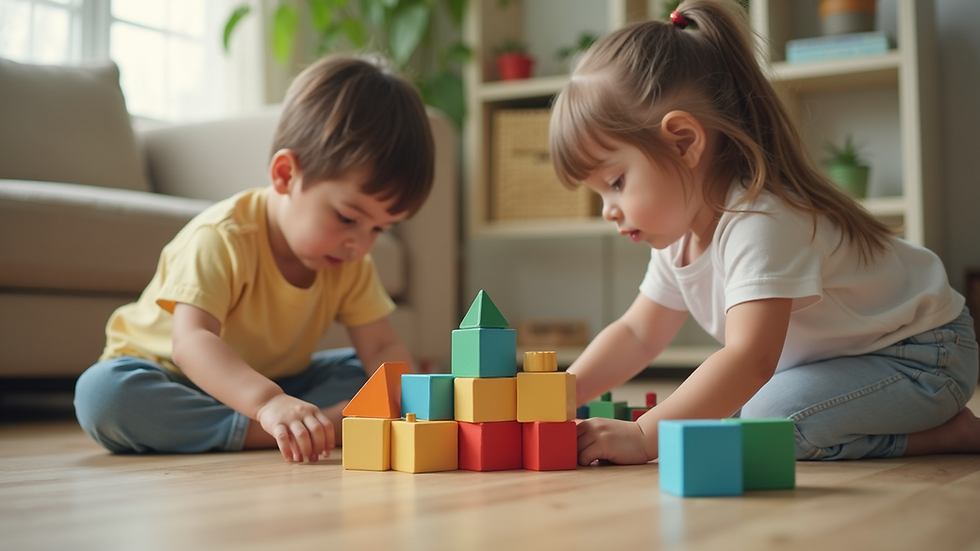Nurturing Toddler Growth with Effective Strategies
- Young Rizz

- Oct 23, 2025
- 3 min read
Watching toddlers grow and develop is a remarkable journey filled with excitement and challenges. Their rapid changes in physical, emotional, and cognitive abilities require thoughtful nurturing. Implementing effective toddler growth strategies can help support their development in a balanced and healthy way. This article explores practical approaches to fostering toddler growth, ensuring they thrive during these formative years.
Understanding Toddler Growth Strategies
Toddler growth strategies focus on creating an environment that promotes healthy development across multiple domains. These strategies include providing proper nutrition, encouraging physical activity, fostering emotional security, and stimulating cognitive skills. Each area plays a vital role in shaping a toddler’s overall well-being.
Nutrition and Healthy Eating Habits
Good nutrition is the foundation of toddler growth. Toddlers need a balanced diet rich in essential nutrients such as proteins, vitamins, minerals, and healthy fats. Parents and caregivers should:
Offer a variety of fruits and vegetables daily.
Include whole grains and lean proteins.
Limit sugary snacks and processed foods.
Encourage regular meal and snack times to establish routine.
For example, serving colorful vegetable sticks with hummus or small pieces of grilled chicken with brown rice can make meals both nutritious and appealing. Hydration is equally important, so water should be the primary drink offered throughout the day.
Encouraging Physical Activity
Physical activity supports muscle development, coordination, and overall health. Toddlers are naturally curious and energetic, so providing safe spaces for movement is essential. Some effective strategies include:
Setting up obstacle courses with cushions and tunnels.
Encouraging outdoor play like running, jumping, and climbing.
Introducing simple games that involve throwing or kicking balls.
These activities not only build strength but also improve balance and motor skills. Aim for at least 60 minutes of active play daily, broken into shorter sessions if needed.

Fostering Emotional Security and Social Skills
Emotional growth is just as important as physical development. Toddlers need to feel safe and loved to explore their world confidently. Caregivers can nurture emotional security by:
Responding promptly and warmly to their needs.
Establishing consistent routines to create predictability.
Encouraging expression of feelings through words or play.
Social skills develop through interaction with others. Organizing playdates or group activities helps toddlers learn sharing, cooperation, and empathy. Reading books about emotions and social situations can also support this growth.
What are the 4 stages of child development in early childhood?
Understanding the stages of child development helps caregivers tailor their support effectively. Early childhood is typically divided into four key stages:
Infancy (0-12 months) - Rapid physical growth, sensory exploration, and attachment formation.
Toddlerhood (1-3 years) - Development of motor skills, language acquisition, and beginning of independence.
Preschool (3-5 years) - Enhanced cognitive abilities, social interaction, and emotional regulation.
Early school age (5-8 years) - Refinement of skills, increased focus on learning, and development of self-concept.
Each stage builds on the previous one, making it important to provide age-appropriate activities and support. For toddlers, this means encouraging exploration while setting safe boundaries.

Stimulating Cognitive and Language Development
Cognitive and language skills grow rapidly during toddlerhood. To nurture these areas, caregivers can:
Talk frequently with toddlers, describing actions and objects.
Read books together daily, asking questions about pictures and stories.
Provide puzzles, blocks, and sorting games to develop problem-solving skills.
Sing songs and nursery rhymes to enhance memory and rhythm.
Using open-ended questions like "What do you think will happen next?" encourages toddlers to think critically and express themselves. Limiting screen time and promoting hands-on activities are also beneficial.
Creating a Safe and Stimulating Environment
A toddler’s environment should be both safe and stimulating to encourage exploration. Safety measures include:
Childproofing furniture and electrical outlets.
Keeping small objects out of reach to prevent choking.
Supervising playtime closely.
To stimulate curiosity, provide a variety of sensory experiences such as:
Textured toys and materials.
Water and sand play.
Nature walks to observe plants and animals.
Rotating toys and introducing new activities regularly keeps toddlers engaged and eager to learn.

Supporting Toddler Growth Through Consistency and Patience
Growth does not happen overnight. Consistency in routines, patience during challenges, and positive reinforcement are key to successful toddler growth strategies. Celebrate small achievements and provide gentle guidance when toddlers test limits.
Remember, every child develops at their own pace. If concerns arise, consulting professionals who specialize in early childhood development can provide valuable support and resources.
By combining nutrition, physical activity, emotional nurturing, cognitive stimulation, and a safe environment, caregivers can create a strong foundation for toddlers to flourish. These strategies empower toddlers to reach their full potential and build confidence for the years ahead.



Comments